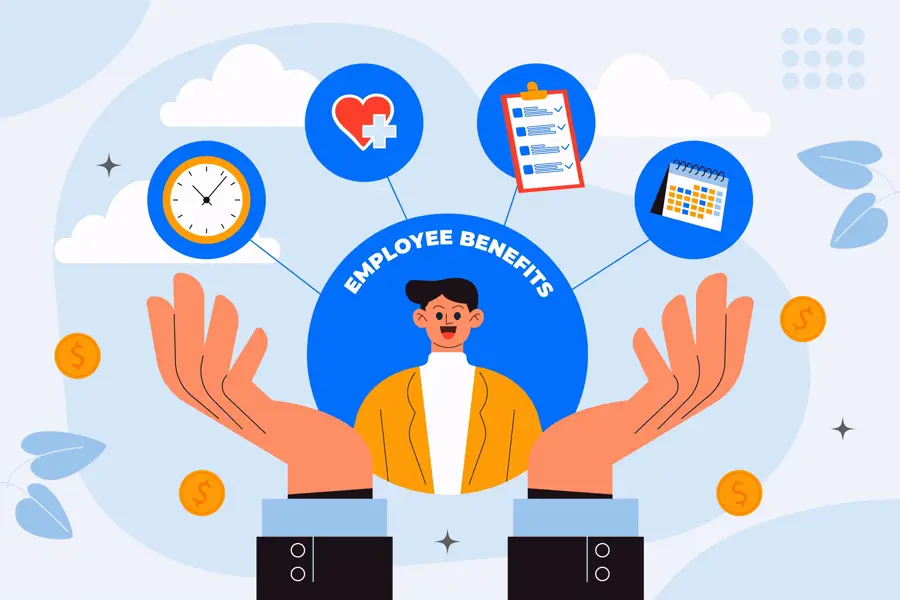HR Compensation & Benefit (C&B) Jobs
1. What is C&B?
The human resources department is directly responsible for planning and developing strategies to attract top talent for the company while maximizing the quality of the workforce and ensuring employees' long-term commitment. Specifically, C&B professionals are considered responsible for determining compensation levels for all employees. So what is C&B? Let's find out together:
It stands for Compensation & Benefits. This includes both cash and non-cash components that an employee values. For example, base/basic salary, bonuses, incentives, and commissions fall under cash components. While medical insurance, work-from-home options, casual/simple office attire, employee events (annual company outings, health talks, free training/workshops sponsored by the company, etc.), phone, car, etc. are non-cash components.
C&B refers to Compensation & Benefits in HR terms. Though both may seem similar, there is a subtle difference worth noting. Compensation is the wages or salary paid to an employee in monetary form in exchange for work performed by them: wages for blue-collar workers salary for white-collar employees or allowances for staff. Benefits differ from compensation because they are the non-monetary parts provided to an employee to motivate them to perform their duties. These may include leaves, meal allowances, insurance plans from the company, vacations, etc.

2. Role and Responsibilities of C&B
C&B professionals are responsible for leading and overseeing the design and management of HR functional activities. This includes all people resourcing, rewards, and compensation as well as developing and implementing reward strategies to attract potential candidates. Strong communication and interpersonal skills are imperative to ensure all practices are well-aligned to the organizational strategy.
It would be beneficial to connect well within both internal and external networks. Staying continually updated with current and future HR trends can provide valuable insights, impacting the profitability of your company.
The C&B professional runs specialized processes and agendas independently under the oversight, management, and leadership of the Head of C&B. They introduce new processes, collect feedback on the performance of compensation processes, and develop/implement process improvements.
They have full accountability for the compensation budget including monitoring, reporting, and regular budget adjustments. Professionals undergo regular training for HR business partners and line managers. They continually work to enhance awareness about the compensation program within the organization.
- Prepare compensation & benefits budget, including monitoring, reporting, and regular budget adjustments
- Coordinate C&B processes like salary planning, bonus planning, introducing new benefits, etc.
- Design and build compensation policies
- Analyze different components of total rewards in the organization and prepare reports on internal equity and external competitiveness
- Design and develop various variable pay schemes (incentive plan for the Sales function, bonus plan for Support Office role etc.)
- Work closely and manage relationships with external compensation consulting firms
- Lead and manage compensation projects for the entire organization
- Participate as a member in groups for various projects and strategic initiatives
- Policy design to narrow compensation gaps of employees (introduce internal equity at affordable costs)
- Manage complex rail routes using varied HR and Compensation policies
- Advise senior leaders in making tough decisions in compensation, benefits, and employee motivation domains
- Manage, lead, and develop C&B analysts
- Represent the organization at various HR conferences

3. Required Skills for C&B
Compensation management is a challenging job. Deciding on compensation for employees' efforts usually involves profitability and fairness considerations. The fact that this job requires extensive research, industry knowledge, and adeptness in a business environment means only the best compensation managers survive.
To achieve top results as a compensation manager, it is important to have the right skills to excel at the job. Considering what it takes to excel as a benefits and compensation manager at your organization, here is a list:
Resourcefulness - Working as a C&B manager often means utilizing multiple resources. You may find yourself conducting salary surveys, researching job types, delegating tasks to various job roles, and working with management teams to develop robust compensation programs. It comes as no surprise that having abundant resources is key to succeeding as a C&B manager, because without accurate and ongoing information, this can become overwhelming.
Communication - A C&B manager is also required to communicate well, using various formats. Writing is one of the top skills frequently used by compensation managers. Providing compensation documents, and presentations and working with HR teams to regularly update policies commonly occur. Working on clear and concise written communications about compensation provided by the company.
Negotiation - When a C&B manager steps into executive meetings to push for raises or benefit changes, they should become a strong negotiator. Leveraging salary surveys based on the latest compensation from competing companies can help in this process. Being able to negotiate for more attractive compensation will help your organization become a preferred employer, thus acquiring top talent allowing for more innovation and growth.
Analysis - What does the compensation manager do with all the data collected from salary surveys, reports, and other information? They must have strong analytical skills to determine the meaning of it for business objectives. Analysis skills often help C&B managers detect trends, conduct subsequent planning sessions, and drive compensation changes in target areas.
Delegation - Typically, a C&B manager has a team of site-based C&B managers reporting to them. So delegating some tasks to those with the best skills to handle them is a large part of the job.
Business savvy - A C&B manager needs to see the bigger picture around the types of compensation and benefits that should be provided to employees. This means talking regularly with recruitment, HR, and oversight teams to see what drives performance. Without this vision, compensation plans may not meet overall needs.
Expertise - At least five to ten years in an industry can go a long way towards helping a C&B manager succeed. But this takes it a step further. A skilled C&B manager will seek to outperform competitors through creative compensation and powerful benefits delivered to the workforce.
Technology - Along with being resourceful, leading C&B managers are moving towards technology to achieve their goals. Using computer-based salary surveys, signing up for industry alerts, and accessing cloud-based compensation tools are all enabled through technology-based solutions.







